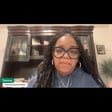Become a Creator today!Start creating today - Share your story with the world!
Start for free
00:00:00
00:00:01

Episode Fourteen: Your Guide to Co-Parenting
After a separation or divorce, co-parenting with an ex-partner can be a challenging and emotionally charged experience. In this episode, Darlene Taylor, certified professional parenting and life transitions coach, therapist, and former clinical social worker, helps guide you through co-parenting and navigating differences.
As the author of "It's Not About Us," Darlene shares her expertise on navigating the complexities of co-parenting and maintaining a healthy relationship with your ex for the sake of your children.
Transcript
Introduction and Disclaimer
00:00:06
Speaker
Welcome to the Guardians of Hope podcast, where we bring together parents, nonprofits, legal and medical experts dedicated to positively impacting children's lives. I'm Cynthia Ramser and your host.
00:00:19
Speaker
Before we begin, you all know the deal. I say this every episode. This content should not be used as legal or medical advice. The purpose of this podcast is to inform and unite. So please seek advice from your attorney or doctor to address your own needs. The thoughts and opinions of my guests are not necessarily my own. This is a platform for sharing.
Challenges of Co-parenting
00:00:44
Speaker
After separating from your partner with whom you have kids with, it may be difficult to maintain a relationship with that person for the sake of healthy co-parenting.
00:00:55
Speaker
In the early stages of my co-parenting journey, someone once told me, you can't hate your ex because your kid is half of them. Or can you?
Darlene's Co-parenting Journey
00:01:07
Speaker
Darlene Taylor, certified professional parenting and life transitions coach, therapist and former clinical social worker is here to help guide you through co-parenting and navigating differences.
00:01:19
Speaker
She is the author of It's Not About Us. Darlene, thank you so much for joining me today. Thank you for having me. I'm excited to be here. Yeah, I'm excited to talk about this topic with you. So why don't you start by telling us about your work and your background.
00:01:36
Speaker
Well, you spoke a little bit about it in my introduction. Thank you. I have a background as a clinical social worker and currently I'm working as a life transition coach, kind of specializing in co-parenting coaching.
00:01:50
Speaker
For about 15 years, like I said, I worked as a therapist and a professor and then transitioned into coaching, generalized sort of life coaching. And then I wrote a book. And so the book was sort of born out of this huge transition that I had in my own life. In 2019, I moved from Cincinnati, Ohio to Los Angeles, California, essentially because my ex-husband asked me to.
00:02:17
Speaker
And most of the time when people hear that, they're like, what in the world? I would never move anywhere for my ex. I can't believe you moved across the country. And my response is always the same. I didn't move for him. I moved for our daughter. At the time, our daughter was 12 years old and about to start seventh grade.
00:02:35
Speaker
And I'd been divorced from her dad for about 10 years at that point. And our divorce was rocky, as most are. And the beginning of our co-parenting journey was tense, to say the least. But we had arrived at a place that we were really friends again and working really well together.
Prioritizing the Child's Needs
00:02:54
Speaker
And so he got an amazing job opportunity here in LA and came to me and said, hey, I really would like to take this job, but I don't want to leave our daughter. So would you consider moving?
00:03:06
Speaker
And after a lot of soul searching, lots of talks with my friends and family and really just kind of trying to figure out what the right answer was, I arrived at the place where I thought, yeah, you know what, I'm going to go because
00:03:24
Speaker
Once you have a kid, it's not about you anymore. And particularly once you go through a divorce, it's not about you. It's not about your ex. It's not even about the relationship you have with your ex. It's about your child and what's best for your child. And what was best for her is to have us both in her life consistently at the same time and without having to navigate cross-country
Approach to Co-parenting
00:03:45
Speaker
trips. And so we moved. And so the book is really about
00:03:49
Speaker
my reflection on how we got to this place where I would make this decision and all of the lessons that I learned about co-parenting and how to build a relationship after divorce that's really healthy for your kids, but also for yourself to try to get you all in a good place where everyone can move forward in a healthy way.
00:04:09
Speaker
My mission when I talk about co-parenting coaching is really to support parents as they sort of navigate those tricky post divorce waters and really to help minimize the damage that's done to kids by parents who just can't seem to figure out how to work together.
Four Pillars of Co-parenting
00:04:23
Speaker
And so that the co or the, I'm sorry, the subtitle of my book is a co-parenting survival guide to taking the high road. So that's what I call my type of co-parenting is sort of co-parenting from the high road.
00:04:35
Speaker
excellent and what a mature decision you made and for the best interest of your child, your family really because you're still family no matter what. Exactly. That's what I think. That's the theme of the book, yes. Yeah. Oh, that's great. So, you know, not everyone is going to compromise
00:04:54
Speaker
in that way, but there are ways to compromise and make things easier. Again, just thinking about our kids. What does compromise look like when you're helping other parents navigate this? I think the first thing, I have four pillars of co-parenting that I talk about in the book, which are mutual respect, trust.
00:05:22
Speaker
flexibility and I can spacing on the fourth one right now. But essentially, it is about compromise. And the big one with compromise is trust, trusting your ex partner to be the parent that you thought that they were going to be when you all decided to have a family.
00:05:38
Speaker
You know at some point you look at this person said hey you know i think i think this is the person i want to build a family with a new trusted that they would be the kind of parent that you want for your child so you have to find a way to get back to that space and trust them to to be the parent that you thought they were going to and then understanding that different doesn't mean wrong or bad.
00:05:59
Speaker
You know, people are different and parenting styles are different even when you're married. Parenting styles are different and so understanding that just because someone's not doing it the way that you would do it doesn't necessarily mean that that's bad or wrong or not good for your child. And so being able to step back.
00:06:16
Speaker
And then the last piece i guess i would say with compromises really. Understanding what winning means you know oftentimes i mean divorce itself is so adversarial and i think we get you know in these in this you know mental boxing ring with this person right and we're all you know in our corners ready to fight all the time but understanding that winning really means doing what's best for your kid.
00:06:37
Speaker
and not getting your way. Every decision doesn't have to be whether he won or she won or
Common Co-parenting Mistakes
00:06:43
Speaker
you won. It's about doing what's best for your kid. And I think if you can keep that at the center of your decisions, then you can really, it helps you be able to compromise a little bit more easily. All right. So what are some of the common mistakes?
00:07:00
Speaker
I would say that probably the biggest common mistake is trying to control or micromanage what happens with the other parent. I think it's really hard to let go of that control and not know what's going on at the other house.
00:07:16
Speaker
But I think that's what keeps people in this place of arguing and fighting. And that reminds me of the fourth pillar of co-parenting that I forgot, which is consistency. And that kind of does tie in with the common mistakes, because what you want to do is try to keep as much consistency around parenting and around, you know, the expectations that you have for your children, as you want to keep things as consistent as you can. So that's obviously why it's one of the
00:07:43
Speaker
four pillars, but that is a mistake that some people make. That goes into the next one, which is a huge one that I see is just making these unilateral decisions about your children. You feel like, well, we're divorced and I don't have to talk to this person and I'm going to decide to put my kid in this activity or we're going to do this or we're going to do that and not having that communication with the other parent.
00:08:06
Speaker
You never want the other parent to feel like you're trying to cut them out of your child's life. I think that is one of the things that really can cause a lot of strife between co-parents is making these unilateral decisions.
00:08:22
Speaker
In the book, I think when I talk about that, it's about thinking about it. Is this a decision that you would have made on your own if you had stayed married? And if so, then cool, go ahead and do that. But if it's something that you would have discussed when you were married, that doesn't change. Those rules don't change now that you're divorced, right? This parent still has a say in what goes on in your child's life. And so being able to keep those lines of communication open, I think oftentimes people feel like once they're divorced, they don't have to talk to that person anymore.
00:08:51
Speaker
that's you know honestly i probably talk to my ex more as a co parent that we were married just sort of everything so how funny is that and i think one of the biggest things.
00:09:06
Speaker
that I work with parents on in coaching is doing your work to heal. That's I think one of the biggest mistakes when it comes to co-parenting is not understanding that you've got to do your own work to heal and get through, work through the pain of the divorce and accept your new family and your new life and what that looks like now because that's the only way you're going to be able to build on the family that you have now.
00:09:31
Speaker
And so not doing your own work to heal, I think is probably one of the biggest mistakes that people can make. Great. Thank you, Darlene. So let's talk about something for the newbies.
00:09:47
Speaker
very emotional time for people who just get divorced or separated. How do we emotionally separate ourselves from the frustrations of
Emotional Separation from Past Relationships
00:09:57
Speaker
the relationship or the ex-relationship and put the focus on our kids?
00:10:03
Speaker
I think that's where the healing piece comes and you've got to do your own work that has to be a piece of co-parenting. I always say you can't pour from an empty bucket. I think we all as parents want to be the best we possibly can for our kids. If you're not taking care of yourself, you can't possibly be the best parent that you want to be.
00:10:26
Speaker
And so, you know, and I think it's more than just relying on your friends and family, right? We know that they're going to be there as our support system, but really, you know, seek out therapy, seek out groups, you know, support groups. Whatever is going to help you mend your heart, right? And get to a place where you can really separate the partner from the parent. That's a key piece of co-parenting.
00:10:49
Speaker
is being able to separate you know our relationship whatever that is whatever that was and is now is over here and our parenting relationship is over here and those are two completely separate things and figuring out okay this is a you know and sometimes it's about looking at it like a business partnership at the beginning like we have a common goal and our common goal is to raise the best kid we can.
00:11:10
Speaker
So I'm bringing this to the table. You're bringing this to the table. We're going to have to work together and figuring out how to keep that focus and keep those things compartmentalized. I don't typically say that it's good to compartmentalize your life, but in this respect, until you can mend some of that,
00:11:30
Speaker
and bring down the emotions, I think that that's a really healthy place to be. And so when you're talking about making decisions and communicating, oftentimes it's about taking the person out of the equation, separate what's being asked from who's doing the asking. Because sometimes, especially when it's so emotional, we get so mad and we're just gonna say no because we can and because this person irritates us and because they said no last time for no reason. So I'm gonna say no this time.
00:11:56
Speaker
And so being able to just really compartmentalize that stuff and separate it and look at what's being asked, is this good for our kid? And if so, go with that. There's going to be a lot of tongue biting. I did not say the high road was easy or fun. Yeah, that's right. But it's always the best. It's always the right thing to do. It's always the best thing to do. It just is. It's always the best thing to do. And so just really being able to
00:12:26
Speaker
For me, I really wanted to be proud of the way that I co-parented. I felt like
00:12:33
Speaker
The only person that I really owed an explanation to about my co-parenting was our daughter. And she has the right to ask me why things happened the way they happened, why I did this, why I did that. And I really wanted to be proud and not ashamed of the things that I did. And that was really my guiding light for being able to make those, to separate from my emotions. And so it's about asking yourself, aside from who this other person is, you have no control over how they're going to co-parent or what they're going to do.
00:13:02
Speaker
You have control over yourself. What kind of co-parent do you want to be? Who do you want to be? What kind of mom or dad do you want to be for your kid? And follow that path no matter what this other person does. It's great and ideally we want both people on the high road because that makes life easy for everyone, but sometimes you're the only one up there. And oftentimes to get to the high road, someone's going to have to go up there first.
Easing Co-parenting Over Time
00:13:27
Speaker
And like I said, it's not easy, but it's always worth it and your kids will benefit from it.
00:13:33
Speaker
Now for those who want some light at the end of the tunnel, does it get easier? Yes, it does. I will say that for the most part, I think in the event that you're not in a really toxic relationship and you're not co-parenting with a sociopath or someone who is just dead set on not working with you.
00:13:58
Speaker
In that case, and I know a lot of people who are in that situation, and in that case, sometimes it feels like it doesn't really get easier. But I always say, when we're talking about moving through this,
00:14:10
Speaker
give yourself space to evolve. I say time, space, and grace. Give yourself time understanding that it's going to take a while to adjust to this. Give yourself the space to do that. Give yourself and give your partner the grace to make mistakes and understand that this is going to be in flux. Even what you're
00:14:31
Speaker
co-parenting relationship looks like two years out will maybe probably look different than it does five years out and 10 years out because things evolve and new people come into people's lives and you know emotions you know people heal and all of those things and so
00:14:46
Speaker
I think just understanding that it's going to be a journey, but it does get easier. I think that if you can keep the focus on being your best self, being the best parent that you want to be, and just trying to work for everyone's peace in the equation, not just the peace of your kids and not just peace for you, but not being in that adversarial relationship with your partner is peaceful for them too. People who are at peace don't usually try to seek out war without
00:15:16
Speaker
others, right? So, you know, if we can just try to make that, create that for ourselves and for our children, it kind of spills over into your parenting partner.
Maintaining Personal Identity Beyond Parenting
00:15:25
Speaker
And I think that that's just beneficial for everyone. Yeah, so focus on your child, focus on yourself.
00:15:32
Speaker
I think your next book should be, it's not about them. Yes, yes, yes. Actually, my daughter is now 17 and I was talking to somebody who's asking me about the next book and I said, you know, honestly, I kind of feel like
00:15:47
Speaker
my next book needs to be like, okay, now it is about me, right? Like, when you focus, and I think that that's true for even parents who have stayed married, but when being a parent has been, you know, sort of the center of your universe, it's not like you stop being a parent when they graduate and go off to school, but it definitely changes. And it's not that day to day. And so I was like, I'm looking around at my life, like, what do I do now? Yes, I know.
00:16:11
Speaker
I still have time. Mine's 11. But yes, you're so immersed in being a parent. It identifies you unless you kind of forget that there's a whole other life out there and your kid's going to grow up one day.
00:16:26
Speaker
So true. And it's just, you know, when I in the book I talk, I do talk a little bit about balance and not losing yourself and parenting and sharing with your children the things that make you you and not just mom or dad. But you know, I say that I introduced my I introduced my daughter to Darlene, you know, she got she gets to see the things that I like to do that have nothing to do with her and nothing to do with being a mom. And it's really cool to see her
00:16:50
Speaker
enjoy those with me and through me and be excited about those things. And I think that that's a real benefit for your kids, because then you're sort of modeling for them what you hope that they're able to do as an adult, which is have, you know, have a full balanced life. And so you're not just defined only by one role that you have, because your life is so much, so much bigger than that. Absolutely. Darlene, thank you so much for your time. And you're so informative about this topic, I'm sure.
00:17:19
Speaker
I will ask you to come back to talk about something else related to co-parenting. I love you. Yeah. Thank you. And for everyone listening to learn more about Darlene's work and her book, just visit DarleneTaylor.com and I'll link that information on the podcast description. Perfect. Thank you so much. Thank you.

















